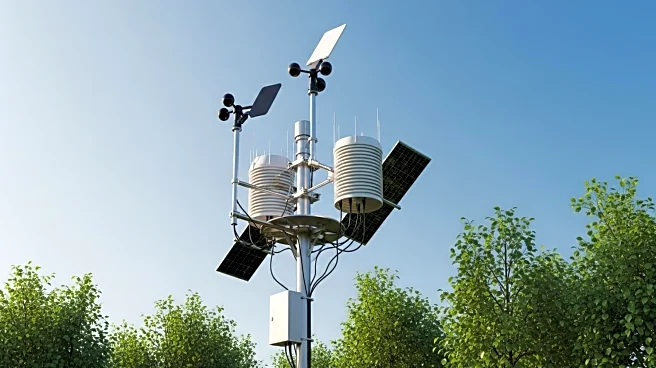What's Happening?
The Trump administration has decided to cut funding for satellite instruments that track Earth's carbon dioxide levels and monitor water contamination and air pollution. These instruments, part of NASA's Orbiting Carbon Observatory and the GeoXO satellite program, are deemed 'beyond their primary mission' and are set to be terminated. The administration's budget request prioritizes weather forecasting over climate research, aligning with a Republican policy to dismantle climate research. This decision has sparked concern among scientists who argue that weather and climate are interconnected, and losing climate data will negatively affect weather forecasting.
Why It's Important?
The decision to cut climate satellites has significant implications for weather prediction and climate research. Accurate weather forecasting relies on comprehensive climate data, which helps track changes and predict new weather hazards. The removal of these instruments could hinder the ability to forecast extreme weather events, impacting public safety and economic activities such as agriculture and fisheries. Critics argue that the cuts reflect a broader trend of the Trump administration to downplay climate change, potentially affecting long-term environmental policy and preparedness for climate-related disasters.
What's Next?
The termination of these satellite instruments may lead to gaps in climate data, affecting the accuracy of weather forecasts. Scientists and environmental advocates may push for the reinstatement of funding or seek alternative methods to gather necessary climate data. The administration's focus on weather-only instruments could lead to further debates on the importance of climate research in government policy. Stakeholders, including NOAA and NASA, may need to adjust their strategies to align with the new budget priorities while maintaining their mission to monitor and predict environmental changes.
Beyond the Headlines
The cuts to climate satellites highlight a deeper political divide over the role of climate research in government policy. The decision reflects a broader skepticism towards climate science within certain political circles, potentially influencing public perception and policy decisions. The long-term impact of reduced climate data could affect global efforts to combat climate change, as the U.S. plays a significant role in international climate research and policy. This development may also prompt discussions on the ethical responsibility of governments to address climate change and protect future generations.










